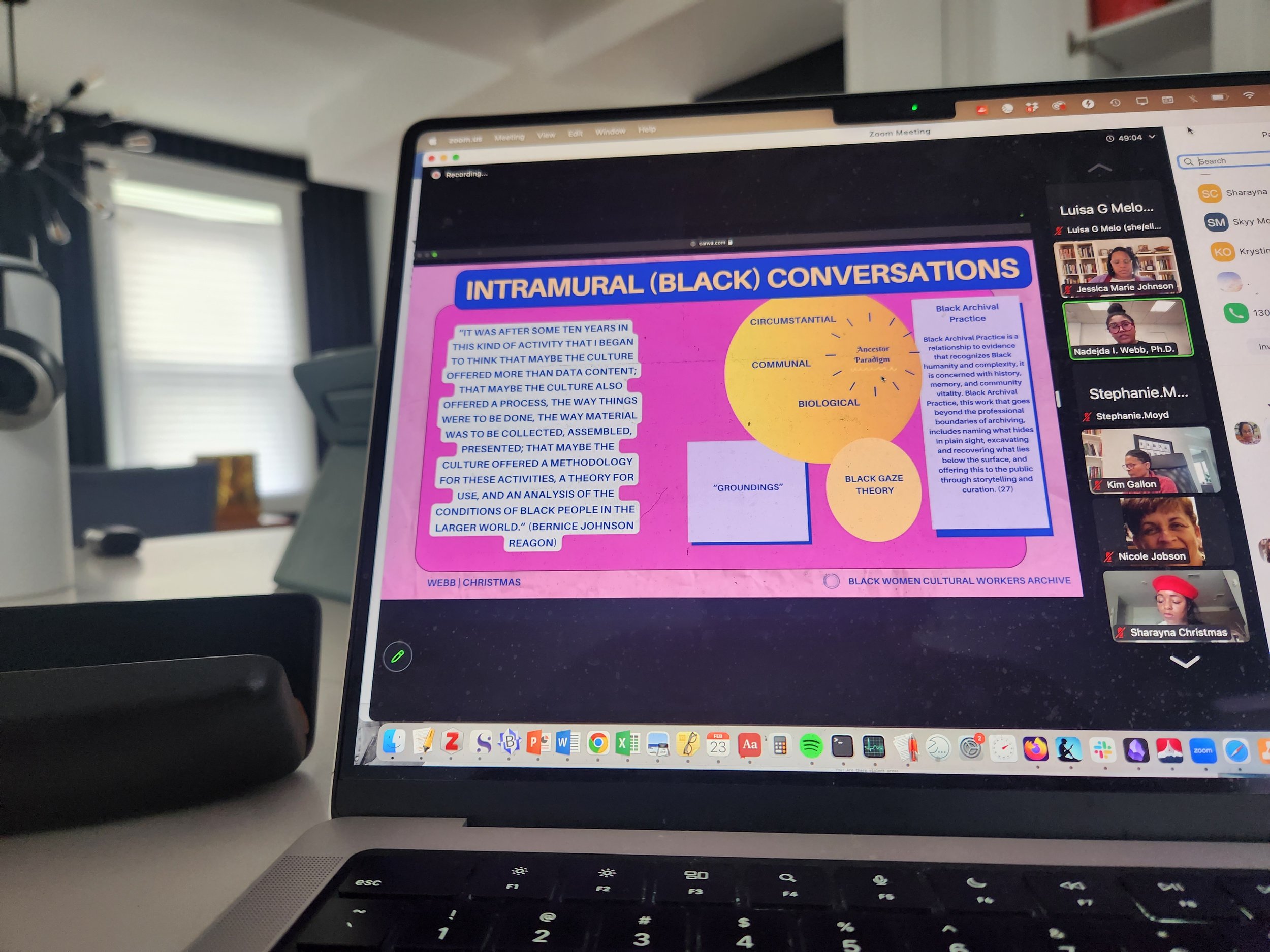
What We Are Working on….
-

Black Beyond Data Reading Group
The Black Beyond Data Reading Group is focused on exploring ideas around community-based data analytics (CBDA), a collaborative approach to data that involves community members in the collection, management, and analysis of data in their communities. The goal of CBDA is to increase knowledge and understanding of social issues that impact a given community and to integrate the knowledge gained with interventions for policy or social change benefiting community members.*
Led by Skyy Moorer, Kim Gallon, and Jessica Marie Johnson
A part of the Black Beyond Data Ecosystem
-

The Black Frontline
The Black Frontline invites you into a world of colliding realities of pain and power, structural racism, longstanding inequity, a history of healing and harm, and their manifestations in community, society and nation.
Directors: Esther A. Armah (CEO,
The Armah Institute of Emotional Justice) and Kim GallonA part of the Black Beyond Data Ecosystem
-
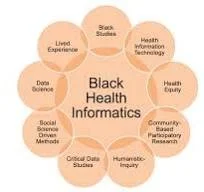
Black Health Informatics Working Group
The Black Health Informatics Working Group gathers key health, policy, and humanities scholars to discuss and intervene in health data conversations worldwide.
Director: Kim Gallon
A part of the Black Beyond Data Ecosystem
-
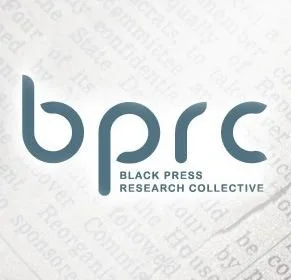
Black Press Research Collective
The Black Press Research Collective (BPRC) is dedicated to generating print and digital scholarship on the Black Press. We are primarily interested in the Black periodical press, although we engage work that embraces a more capacious definition of the Black Press that includes radio and broadcast journalism. The BPRC is dedicated to training new generations of Black Press scholars, developing Black Press studies as a discipline, and connecting African Diasporic communities to historical and contemporary Black periodicals.
Director: Kim Gallon
A part of the Black Beyond Data Ecosystem
-

Community Data Hub
The Black Beyond Data project connects the fields of digital humanities, Black studies, and data and computation to create a critical mass of scholars and research using digital humanities against racial injustice. For more information regarding the Black Beyond Data project, its mission, and leadership team please visit their website. The Community Data Hub is being built as part of the Community Data Project at St. Francis Neighborhood Center. This is the culmination of three years of work as part of the Black Beyond Data project at Johns Hopkins University and funded by the Mellon Foundation.St. Francis Neighborhood Center seeks to document historical evidence of its history and relationship with the Reservoir Hill/ Penn North Black community.
Community members will interact with and control the use of their own data in an accessible and interactive format while allowing community members to contribute their own narratives to move beyond the numbers and tell a more complete and nuanced story of Black life in West Baltimore. Community members will be able to share photos, stories, and other digital heritage items that deepen the understanding of data and community and open a dialog surrounding Black data while strengthening connections within and between subcommunities.Led by Skyy Moorer (SFNC)
A part of the Black Beyond Data Ecosystem
-

K4BL: Keywords for Black Louisiana
Keywords for Black Louisiana (K4BL) is a collective of researchers creating digital projects highlighting the Black life and culture of the Gulf Coast.. K4BL is building a community-engaged digital edition of annotated, transcribed and translated manuscript documents from 18th century (French and Spanish) Louisiana. The stories in these documents describe the lives and resistance of enslaved and free people of African descent against bondage, colonialism, and the everyday terror of slavery.
Founding Director & Editor: Jessica Marie JohnsonManaging Editor: Guadalupe Garcia (UCSD)
Senior Research Editor: Leila Blackbird (University of Chicago)
Digital Curation Fellow & Co-Project Manager: E. G. Palazzolo (Johns Hopkins University)
Community Engagement Fellow & Co-Project Manager: Chenise Calhoun (Tulane University)
Community, Ethics, and Accountability Lead: Dr. Laura Rosanne Adderley (Tulane University)
-

The Creation of a Food Apartheid in Baltimore
“The Creation of a Food Apartheid in Baltimore” incorporates zoning maps, interviews, ethnographic work with the Black Yield Institute, and Johns Hopkins University’s interventions in the city of Baltimore. The final project will be in the form of a podcast with visual elements that will have a home on a website.
A 2021 Center for Africana Studies Honors Thesis
Principal Investigator: Georgia McFarland
Image Credit: Super Jet Advertisement, Baltimore Afro-American, 1968 -

Gender, Reproduction & Marronage in New Orleans
A Runaway Slave Ads Storymap for the Open Classroom for New Orleans Culture.
Curated by the Archipelagos of Marronage, a micro-lab of the Diaspora Solidarities Lab , this StoryMap will guide users through the meanings of marronage using 19th-century runaway slave advertisements from New Orleans. Users are encouraged to follow along and mine the perspectives and actions of enslaved women who navigated urban slavery. As users scroll, they will learn how to locate advertisements and interpret metadata to understand how gender and reproduction shaped instances of fugitivity and refusal.
Co=Leads: Halle-Mackenzie Ashby, Arianna B. Browne, and Dr. Gregory Jamian Smaldone
Part of the Diaspora Solidarities Lab archipelago
-

Health Humanities: Dismantling Structural Injustice in Health Care
National Endowment for the Humanities Institute for Health Professions Education Faculty
Held virtually from April through October 2024
Johns Hopkins University School of Medicine. Principal Investigator(Principal Investigator(s): Dr. Alexandre White and Dr. Heidi Nicholls (SUNY-Binghamton)
-

Metropolitan United Methodist Church History Project
In celebration of Metropolitan United Methodist Church’s 195th Anniversary, this project examines this historic Black church’s vast past through film. Located on 1121 West Lanvale Street in West Baltimore, Metropolitan United Methodist Church was founded by Truman Pratt (1775-1877), a formerly enslaved man from Anne Arundel County, Maryland. With a nearly two century history in the city of Baltimore, this project documents the history of this church from its antebellum roots, its involvement in the Baltimore Civil Rights Movements, to its history today.
Principal Investigator: Dr. Christina Thomas (Postdoctoral Fellow, Walker Center at Jackson State University) -

Open Curriculum for New Orleans Culture
An NEH-sponsored effort that has produced original multimedia materials and document collections for colleges and universities, our project will bring these resources to new audiences through public events organized by teachers, artists, and researchers. Committed to supporting K-12 teachers in exploring the past, present, and future of New Orleans culture in the classroom and beyond.
Principal Investigator: Bryan Wagner, UC-Berkeley
-

Otherwise Bodies
An online exhibit and resource for understanding the intersection of medicine, empire, racism, and resistance.
Directed by Dr. Heidi Nichols (SUNY-Binghamton)
A part of the Black Beyond Data Ecosystem
-
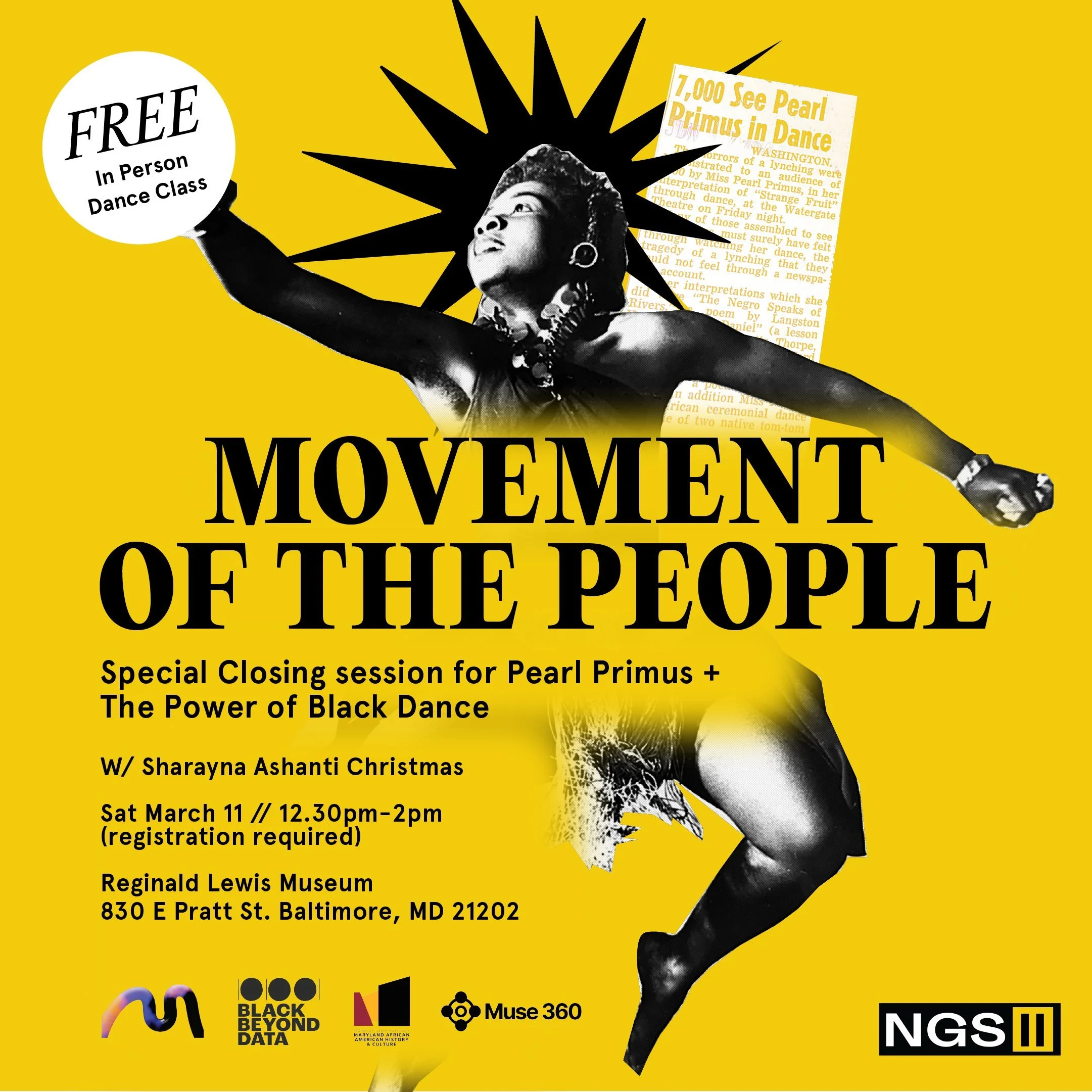
Slavery & Data Community Workshops
Slavery and data community workshops (2022-2024) bring conversations about the grassroots to the world.
Community Partners: Ink, Sweat & Tears (London), African Diaspora Alliance (Baltimore), New Generation Scholars (Baltimore)
A part of the Black Beyond Data Ecosystem
-

Taller Electric Marronage
It all started when:
A group of black, brown, queer, writers, artists decided to plot points across their escape matrix.
Inspired by the petit marronage of our ancestors we steal away on this electric platform, share our journeys + offer what we find along the way…
Winner of the 2020 Garfinkel Prize from the Digital Humanities Caucus of the American Studies Association
Co-Kin Curators: Jessica Marie Johnson and Yomaira C. Figueroa (CUNY/Center for Puerto Rican Studies)Associate Editor: Dr. Nadejda Webb (JHU)
Image: Take + Maintain Exhibition, 2023, hosted by the New Generation Scholars
-
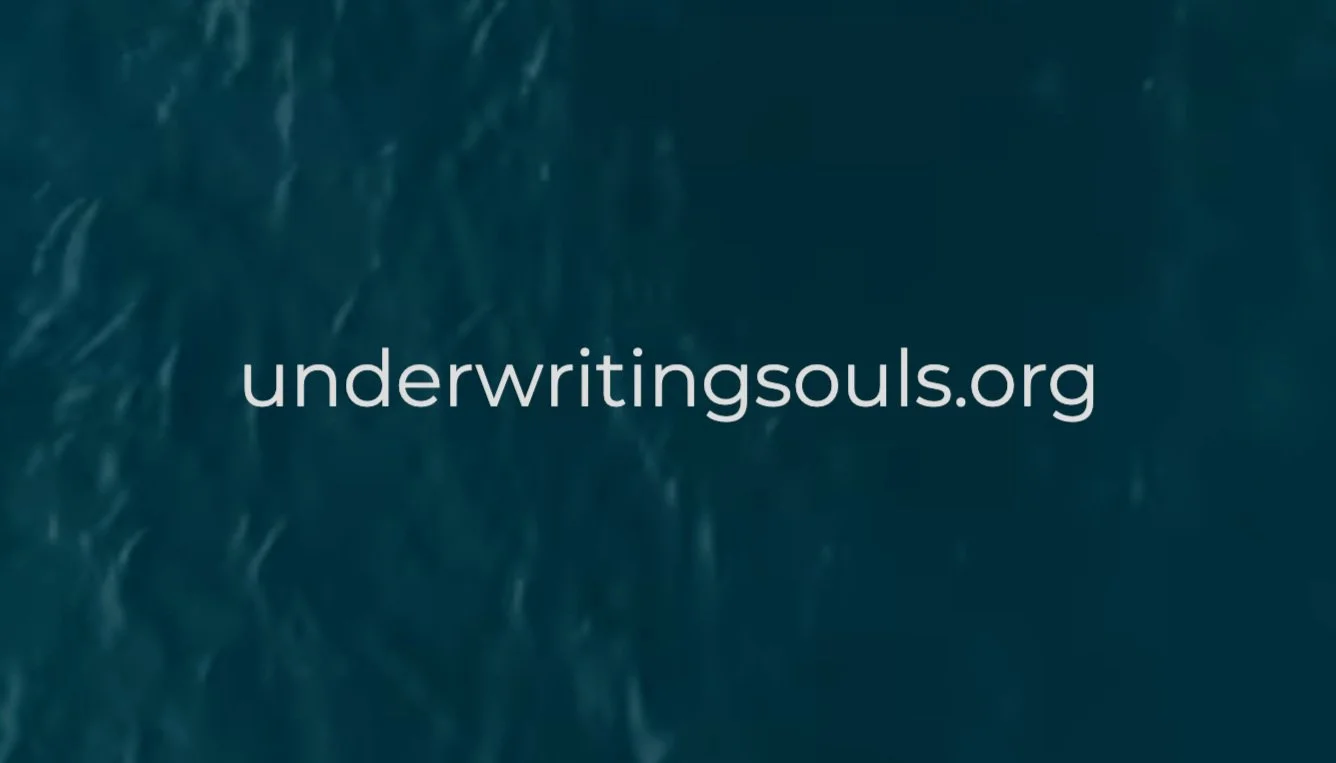
Underwriting Souls
Underwriting Souls aims to contextualize our understanding of a particular archive of slavery, one centered on the financial systems that formed and maintained the Trans-Atlantic Slave Trade until its demise in the British Empire in 1807. It is also meant to serve as a critical means to question and confront the narratives that emerge from relatively unexamined documents. We are grateful to the Mellon Foundation for funding this work and to Johns Hopkins University for facilitating this research.
Developed by Alexandre White Ph.D. and Pyar Seth (University of Notre Dame with further research conducted by Eliza Zimmerman (JHU).
A part of the Black Beyond Data Ecosystem
-
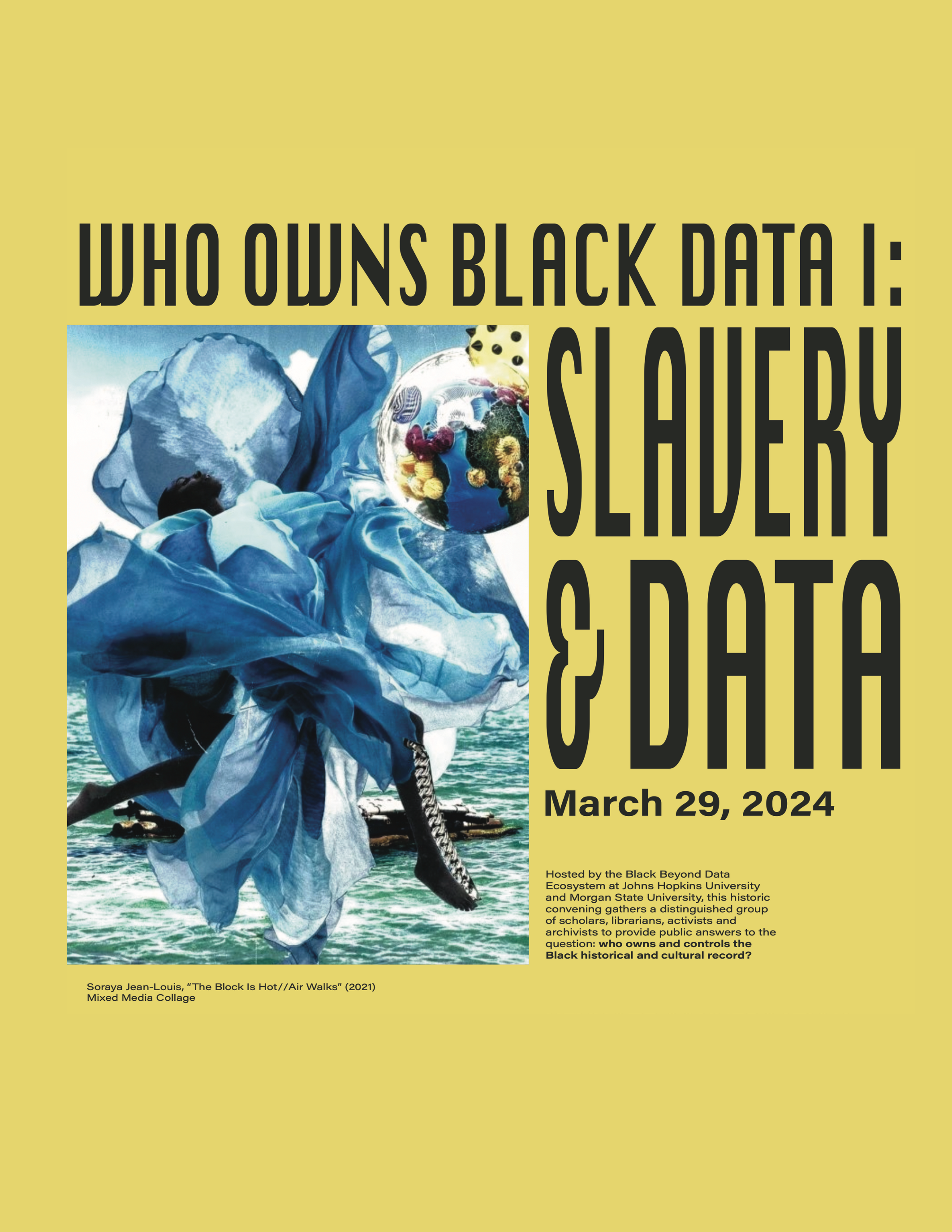
Who Owns Black Data
In this conference, we proposed to gather a distinguished group of scholars, librarians, and archivists from the Americas and Africa to discuss, elucidate, and provide public answers to the question: who owns and controls the Black historical and cultural record? That question suggests a troubling answer as soon as we pose it. That answer is whispered in the halls of academia and once in a while it surfaces in our writings and conferences. That answer also prompts us to ask other important questions which we hope to address in our conference series: How did we end up here? How do we answer the question of ownership and control in the context of today's hybrid record, both analog and digital?
-

salt.codes
Where digital studies comes to bloom ⇢ art, life, design, videogames, digital technologies, and *so* much more. Thrive with us | vibe with us
An irlhumanities + life_x_code 🌱 collaboration -

Bytes of Black Flesh
Speculative censuses and datasets surfacing the “impossible story” (Hartman) in eighteenth-century Louisiana's archive of slavery.
Designer/Director: Jessica Marie Johnson
An AADHum Scholars 2019-2020 Project (more here)
Image Credit: 1731 Louisiana Census, Jessica Marie Johnson -
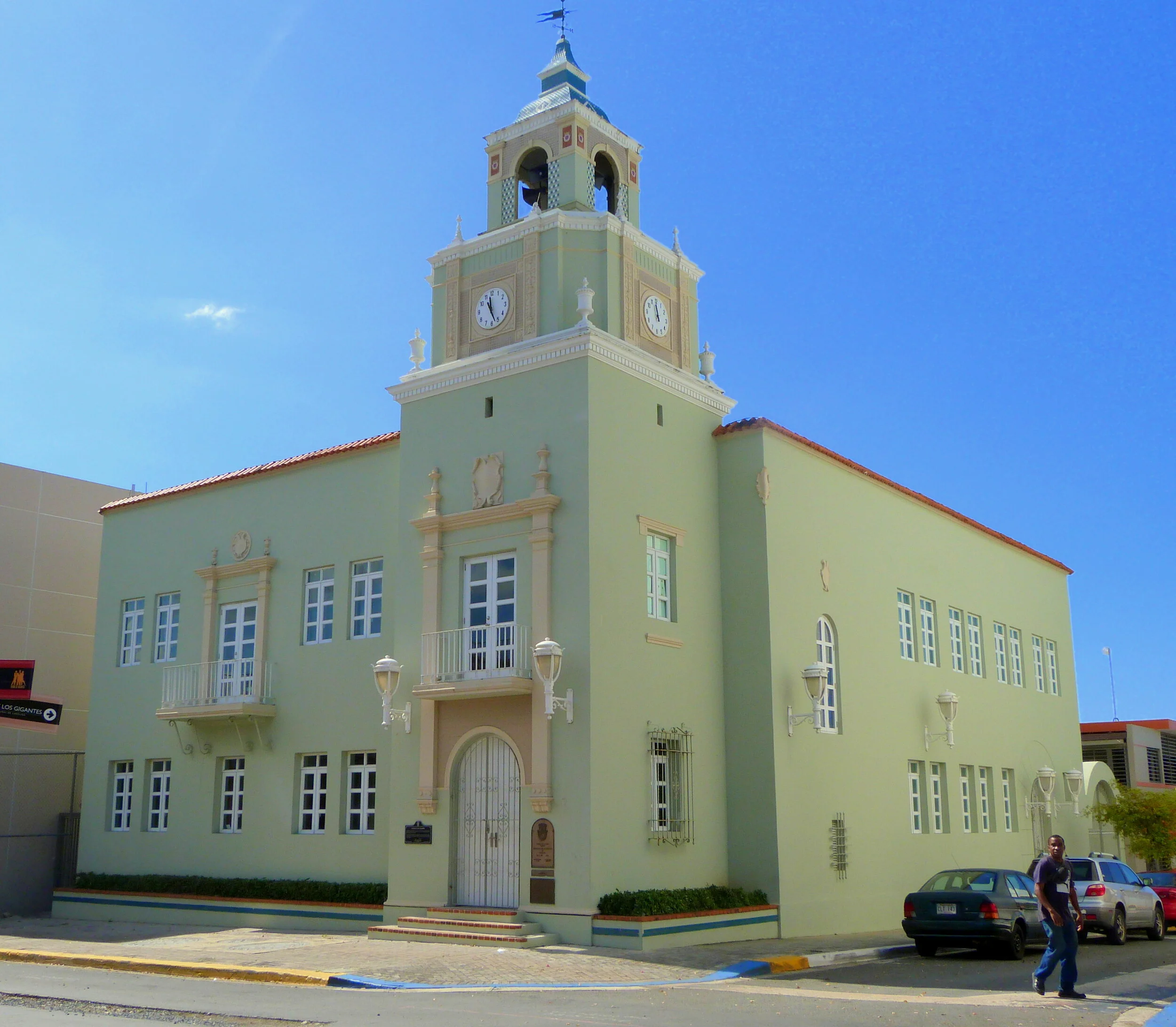
Microdatas carolineses
An archive of print material and data on Puerto Rico’s Carolina community at the turn of the century, as collected by Fernando Pico.
Principal Investigator: Dr. Sarah Bruno
Now part of the DSL microlab Taller Entre Aguas (dslprojects.org)
Image Credit: "Casa Alcaldia - Carolina Puerto Rico" by Ian Poellet is licensed under CC BY-SA 4.0 -

Black World Seminar
The Black World Seminar is a graduate-faculty seminar on the making and meaning of blackness between the 14th and 20th centuries. We consider Africans and people of African descent’s impact on the making of the modern world, from the slave trade to the present. We explore, too, the historical forces which created blackness as a marker on the body and as a political and cultural identity. In beginning chronologically before the Middle Passage, this seminar pays special attention to processes of racialization, diaspora, moments of dislocation, the fashioning of memory, and to the gendered, racialized and generational encounters with capitalism. In this seminar’s thematic emphasis on Black History and Black Studies as disciplines, seminar attendees can expect to interrogate how specific approaches to the Black World developed in response to the political contexts of what’s generally considered “The West.”
In addition to reading works of Black History, the seminar considers what it means to write history “Black.” How do authors challenge white supremacy – bibliographically, methodologically, compositionally, and archivally? How do they exercise and exhibit blackness as a set of descriptive and interpretive commitments? Far more than a physical marker, after all, blackness also represents an epistemology – a way of knowing – or what at time’s been called “black knowledge.” The Black World Seminar thus explores black knowledge as a library of works, a cluster of methodologies, interlocking modes of analysis and critique, and as a practice.